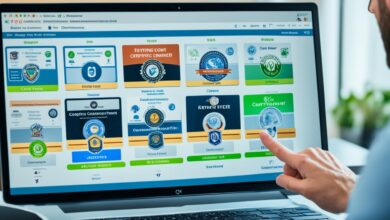Unlock Your Potential with Top Leadership Skills

Leadership skills are more than just a title or position; they are the driving force behind personal and professional growth. Whether you aspire to lead a team, start a business, or make a positive impact in your community, developing effective leadership skills is essential. But what exactly are these skills, and how can you unlock your potential as a leader?
In this article, we will delve into the key principles, strategies, and practices that can help you develop and strengthen your leadership skills. From understanding core leadership principles to mastering customer obsession and bias for action, we will uncover the secrets to becoming an exceptional leader. Are you ready to transform your leadership abilities and unleash your full potential?
Key Takeaways:
- Leadership skills play a crucial role in personal and professional growth.
- Understanding leadership principles is essential for effective leadership.
- Customer obsession and bias for action are key leadership principles.
- Assessing your current leadership skills is the first step towards improvement.
- Continuous learning and self-development are vital for leadership success.
Understanding Leadership Principles
Leadership principles are the guiding values and beliefs that shape the culture and behaviors within an organization. They provide a framework for decision-making and actions, serving as success enablers. These principles are universally applicable and culturally embedded, ensuring their relevance across different organizations and industries.
“Leadership principles serve as the North Star for individuals and teams, guiding them towards achieving success and driving performance.”
Leadership principles are not prescriptive rules or one-size-fits-all solutions. They are meant to be adaptable, allowing leaders to apply their judgment and creativity. They provide a foundation for decision-making but also encourage continuous improvement and learning. Embracing these principles helps leaders cultivate a mindset of growth and fosters a culture of innovation and resilience.
“Continuous improvement is a fundamental aspect of leadership principles, driving individuals and organizations to constantly strive for excellence.”
Leadership principles should be an integral part of an organization’s culture. They should be communicated, reinforced, and demonstrated by leaders at all levels. By aligning behaviors and actions with these principles, organizations create a cohesive and values-driven environment that empowers individuals to achieve their full potential.
Demystifying Leadership Principles
Leadership principles are not prescriptive rules or one-size-fits-all solutions. They provide guidance and direction, allowing individuals to apply their judgment and creativity in their leadership approach. These principles are adaptable and should be tailored to meet the unique needs and challenges of each organization. While following leadership principles does not guarantee immediate success with guaranteed outcomes, they enhance existing leadership competencies and serve as a valuable replacement for outdated practices. However, it is important to note that the implementation of leadership principles comes with its share of challenges and requires dedication, effort, and adaptability to navigate obstacles and achieve desired results.
Customer Obsession as a Leadership Principle
Customer obsession is a crucial leadership principle that prioritizes putting customers first, understanding their needs, and delivering personalized experiences. This principle holds particular significance at Amazon, where customer-centricity is the foundation of their success.
Leaders who embody customer obsession go beyond simply meeting customer expectations; they strive to exceed them by anticipating needs and providing tailored solutions. They understand that personalized experiences create a lasting impact and build loyal relationships.
Embracing customer obsession requires leaders to immerse themselves in their customers’ world. By walking in their customers’ shoes, they gain valuable insights into their desires, pain points, and aspirations. Armed with this knowledge, leaders can empower their teams to develop innovative solutions that address specific customer needs.
Continuous Improvement with Work-Backwards Thinking
A key aspect of customer obsession is a commitment to continuous improvement. Leaders who put customers first work backward from desired outcomes, constantly challenging the status quo and finding ways to enhance the customer experience.
“We see our customers as invited guests to a party, and we are the hosts. It’s our job every day to make every important aspect of the customer experience a little bit better.” – Jeff Bezos, Founder of Amazon
By fostering a culture of work-backwards thinking, leaders encourage their teams to iterate, innovate, and push boundaries. They drive a relentless pursuit of customer satisfaction, analyzing feedback, data, and market trends to inform continuous improvement efforts.
Personalization and Delighting Customers
Customer obsession requires leaders to go the extra mile in providing personalized experiences that delight customers. It involves understanding and valuing each customer as an individual, tailoring interactions, and offering customized solutions.
Personalization can take various forms, such as personalized recommendations, product suggestions, or special promotions. Leaders who prioritize customer obsession ensure that every touchpoint with the customer feels tailored, creating a sense of genuine connection and care.
Through their unwavering commitment to customer obsession, leaders set the tone for the entire organization. They empower their teams to think customer-first, embedding a customer-centric mindset into the fabric of the company culture. This approach fosters innovation, agility, and an unwavering dedication to unmatched customer experiences.
Bias for Action as a Leadership Principle
In today’s fast-paced business world, having a bias for action is a crucial leadership principle. It is about embracing a proactive mindset, making informed decisions, and executing quickly to drive results and foster a culture of productivity and innovation.
Leaders with a bias for action are not afraid to take calculated risks. They understand that inaction can lead to missed opportunities and stagnant growth. By analyzing alternatives and gathering relevant information, they are able to make informed decisions that propel their teams and organizations forward.
Executing quickly is another key aspect of bias for action. Effective leaders understand the importance of speed in business. They recognize that delays can hinder progress and give competitors an edge. By taking decisive action and implementing their decisions swiftly, they stay ahead of the curve and drive tangible results.
A proactive mindset, coupled with a bias for action, encourages leaders to continuously seek ways to improve and innovate. They are not satisfied with the status quo and are always looking for opportunities to optimize and enhance processes. This mindset inspires their teams to think creatively and embrace change, fostering a culture of continuous improvement.
By embodying bias for action as a leadership principle, leaders create an environment where calculated risk-taking is encouraged and proactive decision-making is the norm. This mindset cultivates agility, adaptability, and resilience, allowing organizations to thrive in a rapidly changing business landscape.
Successful leaders understand that a bias for action is not about taking impulsive or reckless actions. It is about having a calculated approach to risk-taking and ensuring that action is taken with purpose and strategic intent. By combining a proactive mindset, making informed decisions, executing quickly, and taking calculated risks, leaders can drive their organizations towards success and achieve remarkable results.
How to Assess Your Current Leadership Skills
Assessing your current leadership skills is a vital step in your personal and professional development. It allows you to gain valuable insights into your strengths and weaknesses, identify areas for improvement, and create a targeted plan for enhancing your leadership abilities.
Self-reflection is an essential component of assessing your leadership skills. Take the time to introspect and evaluate your actions, behaviors, and decision-making processes. Consider your approach to problem-solving, conflict resolution, and team dynamics. Reflecting on your experiences can provide valuable self-awareness and help you understand how your leadership style impacts others.
Seeking feedback from others is another crucial aspect of assessing your leadership skills. Reach out to your colleagues, managers, or mentors and ask for honest input on your strengths and areas that need improvement. Their perspectives can offer valuable insights and help you gain a more comprehensive understanding of your leadership style.
“Feedback is a valuable gift that allows us to grow and develop as leaders.” – Simon Sinek
Objecively evaluating areas for improvement is essential for professional growth. Take a critical look at your skills and competencies. Identify areas where you may be lacking or need further development. This assessment will provide you with a clear understanding of the specific leadership areas to focus on.
By assessing your leadership skills through self-reflection, seeking feedback, and identifying areas for improvement, you can gain valuable insights into your current capabilities. With this understanding, you can create a targeted plan for enhancing and developing essential leadership skills that will propel your personal and professional growth.
Strategies to Improve Leadership Skills
Effective leaders understand the importance of continuous learning and development to enhance their leadership skills. By investing in self-improvement, leaders can expand their knowledge and skills, adapt to changing dynamics, and inspire their teams towards success.
Continuous Learning
Continuous learning is a cornerstone of leadership development. It involves actively seeking opportunities to expand your knowledge and stay updated with industry trends and best practices. Reading leadership books, attending relevant conferences, and participating in webinars are effective ways to continuously learn and broaden your perspectives.
Furthermore, consider joining leadership training programs and workshops that provide practical insights and allow you to learn from experienced professionals. These programs offer valuable techniques and strategies to enhance your leadership capabilities.
Leadership Mentoring
Another powerful strategy to improve leadership skills is engaging in leadership mentoring. Partnering with a seasoned leader who can provide personalized guidance and share their experiences can accelerate your growth as a leader. They can offer valuable insights, help you navigate challenges, and provide feedback and encouragement to maximize your potential.
Investing in Development
To improve as a leader, it’s essential to allocate resources and invest in your development. Consider allocating time and budget for leadership development activities that align with your personal and professional goals. This could include enrolling in executive education programs, hiring professional coaches, or participating in online courses that focus on specific leadership competencies.
Investing in your development demonstrates your commitment to growth and sends a powerful message to your team about the value you place on continuous improvement. It also increases your self-confidence and equips you with the skills needed to lead with impact.
Expand Knowledge and Skills
Expanding your knowledge and skills in areas related to leadership is instrumental in becoming an effective leader. Take the initiative to learn about different leadership styles, communication techniques, conflict resolution strategies, and other relevant topics. This broader range of knowledge will equip you with a versatile skill set and enable you to adapt your leadership approach based on the specific needs of your team and organization.
Remember, leadership is a lifelong journey, and investing in continuous learning, seeking mentorship, and expanding your knowledge and skills are key strategies to improve and excel as a leader.
Importance of Self-Development for Leadership
Self-development plays a critical role in the growth and success of leaders. It encompasses various aspects such as self-awareness, emotional intelligence, goal setting, and continual learning. By focusing on personal growth, leaders can enhance their effectiveness and positively influence those around them.
“The greatest leaders are those who invest in themselves and their continuous development.” – John C. Maxwell
Cultivating Self-Awareness
Self-awareness is the foundation of effective leadership. It involves understanding one’s strengths, weaknesses, values, and blind spots. Leaders with a deep understanding of themselves can make better decisions, align their actions with their values, and build strong relationships with their teams.
Developing Emotional Intelligence
Emotional intelligence is crucial for leaders to navigate complex interpersonal dynamics. It involves recognizing and managing emotions in ourselves and others. Leaders with high emotional intelligence can effectively communicate, empathize, resolve conflicts, and inspire their teams to achieve high levels of performance.
Setting Personal and Professional Goals
Goal setting provides direction and purpose in leadership. Effective leaders set both short-term and long-term goals that align with their vision and values. They continuously challenge themselves, strive for growth, and create opportunities for personal and professional advancement.
Embracing Continual Learning
Continual learning is a hallmark of successful leaders. It involves seeking new knowledge, staying updated with industry trends, and expanding skills and expertise. Leaders who embrace continual learning demonstrate a growth mindset, adapt to change, and bring innovative ideas to their organizations.
By prioritizing self-development, leaders can unlock their full potential and inspire others to do the same. Building self-awareness, developing emotional intelligence, setting goals, and embracing continual learning are essential steps on the journey towards becoming an effective and influential leader.
| Benefits of Self-Development for Leadership | How to Cultivate Self-Development |
|---|---|
| – Enhanced self-awareness and authenticity | – Engaging in self-reflection and introspection |
| – Improved decision-making and problem-solving | – Seeking feedback from trusted mentors and colleagues |
| – Strengthened interpersonal relationships and empathy | – Developing a growth mindset and embracing challenges |
| – Increased resilience and adaptability | – Investing in personal development resources and workshops |
| – Fostering innovation and creative thinking | – Creating a supportive network for learning and collaboration |
Building Essential Leadership Skills
In order to excel as a leader, it is essential to develop and hone a set of core skills that are crucial to effective leadership. These skills include effective communication, decision-making, team-building, and time management.
Effective communication is the cornerstone of successful leadership. Leaders must possess the ability to listen actively and attentively to others, ensuring that everyone feels heard and understood. Clear articulation is equally important, as leaders must be able to convey their thoughts and ideas in a concise and persuasive manner.
Decision-making skills are also vital for effective leadership. Leaders must be able to gather relevant information, analyze various alternatives, and make informed choices that align with the organization’s goals and values. The ability to weigh the pros and cons of different options and make timely decisions is essential for driving progress and success.
Team-building is another critical skill for leaders. Building a high-performing team involves recruiting and developing talented individuals, fostering a collaborative and inclusive culture, empowering team members to contribute their unique skills and perspectives, and leveraging the diversity within the team to achieve exceptional results. Effective leaders know how to create an environment where everyone feels valued and motivated to work towards a common goal.
Lastly, time management is key to maintaining optimal productivity and achieving a healthy work-life balance. Leaders must be skilled at prioritizing tasks, setting realistic deadlines, and allocating their time efficiently to ensure that important responsibilities are fulfilled and that they have time for personal life and self-care.
By building these essential leadership skills, individuals can enhance their ability to inspire and motivate others, make informed and strategic decisions, foster collaboration and teamwork, and manage their own time effectively. These skills are the foundation for effective leadership and play a crucial role in driving success and achieving remarkable results.
Leading with Integrity and Ethics
Leading with integrity and ethics is the foundation of effective leadership. It involves making ethical decisions, building trust and credibility, leading by example, and motivating and inspiring others to achieve remarkable results.
Ethical decision-making is a crucial aspect of leadership. It requires considering moral judgment and weighing different perspectives. Leaders must prioritize the long-term benefits of their choices and ensure they align with ethical standards and principles. By making ethical decisions, leaders demonstrate their commitment to doing what is right, even when faced with challenging situations.
Building trust and credibility is essential for leaders to establish strong relationships within their teams and organizations. Transparency and openness foster a culture of trust, where team members feel comfortable expressing their ideas and concerns. Leaders who consistently act with integrity and earn the trust of their teams inspire loyalty and commitment, creating a foundation for success.
Leading by example is a powerful way to inspire and influence others. When leaders demonstrate the behaviors and values they expect from their team members, they set a high standard. By consistently embodying integrity, ethics, and professionalism in their actions and decisions, leaders inspire others to follow suit. Leading by example creates a positive and productive work environment where everyone is motivated to perform their best.
Motivating and inspiring others is a fundamental aspect of effective leadership. Leaders who possess the ability to motivate and inspire their teams create an environment where individuals are encouraged to take risks, think creatively, and excel. By recognizing and appreciating the contributions of team members, leaders foster a sense of belonging and empower individuals to achieve their full potential.
Leadership is not about being in charge. It is about taking care of those in your charge. – Simon Sinek
In summary, leading with integrity and ethics is a cornerstone of effective leadership. Ethical decision-making, building trust and credibility, leading by example, and motivating and inspiring others are critical elements for leaders to drive success and create a positive work environment. By embodying these principles, leaders can inspire trust, motivate their teams, and achieve remarkable results.
Key Elements of Leading with Integrity and Ethics
| Ethical Decision-Making | Building Trust and Credibility | Leading by Example | Motivating and Inspiring Others |
|---|---|---|---|
| Making choices based on moral judgment | Transparency, credibility, and fostering a culture of trust | Consistently demonstrating desired behaviors and values | Recognizing and appreciating team members, inspiring personal and professional growth |
| Evaluating different perspectives and long-term impacts | Establishing strong relationships within teams and organizations | Inspiring others to follow through actions and decisions | Empowering individuals to achieve their full potential |
| Aligning choices with ethical standards and principles | Fostering an open and inclusive work environment | Setting high standards for behavior and professionalism | Cultivating a sense of belonging and loyalty |
Continuous Learning and Growth as a Leader
Continuous learning and growth are essential for leaders to navigate the ever-evolving landscape of the business world. It involves seeking feedback from colleagues, superiors, and subordinates to gain valuable insights into one’s leadership style and areas for improvement [source].
Engaging in self-reflection is another powerful tool for growth. Taking the time to reflect on your actions, decisions, and relationships allows you to gain deeper self-awareness and identify patterns and behaviors that may hinder your effectiveness as a leader.
Effective leaders understand the importance of embracing change and adaptability. The business landscape is dynamic and continually evolving, and leaders must be willing to embrace new ideas, technologies, and methodologies. By cultivating a mindset that welcomes change, you can navigate challenges with resilience and foster a culture of innovation within your organization.
Expanding knowledge and skills is crucial for staying ahead in a rapidly changing world. As a leader, it is essential to invest in ongoing learning opportunities such as workshops, leadership training programs, and mentoring. Continually expanding your knowledge in areas such as communication, decision-making, and strategic thinking equips you with the tools to lead effectively [source].
“The only way to do great work is to love what you do. If you haven’t found it yet, keep looking. Don’t settle.” – Steve Jobs
Benefits of Continuous Learning and Growth
Continuous learning and growth as a leader offer numerous benefits. It enables you to stay ahead of industry trends and best practices, ensuring you can make informed decisions and lead your team effectively. Embracing change and adaptability fosters resilience, allowing you to navigate challenges with confidence and inspire your team to do the same. Expanding your knowledge and skills not only boosts your confidence as a leader but also allows you to bring fresh ideas and perspectives to the table, driving innovation within your organization [source].
| Benefits of Continuous Learning and Growth | |
|---|---|
| 1. Enhanced Leadership Abilities | Continuous learning sharpens your leadership skills and enables you to adapt to new challenges. |
| 2. Increased Adaptability | Continuously learning and growing helps you embrace change and navigate uncertainties. |
| 3. Expanded Knowledge Base | Continuous learning broadens your understanding of various domains and keeps you up to date with industry trends. |
| 4. Improved Problem-Solving | Continuous learning equips you with new tools and techniques to solve complex problems effectively. |
| 5. Enhanced Innovation | Continuous learning sparks creativity and enables you to bring fresh ideas to your team and organization. |
Embracing continuous learning and growth as a leader is not only beneficial for personal and professional development but also vital for effectively leading and inspiring your team toward success.
No matter where you are in your leadership journey, there will always be room for growth. By seeking feedback, engaging in self-reflection, embracing change and adaptability, and expanding your knowledge and skills, you can become a more effective and influential leader. Continuously investing in your personal growth not only benefits you but also creates a proactive, empowered, and innovative environment within your organization.
Conclusion
Developing leadership skills is a continuous journey that requires self-reflection, feedback, and deliberate practice. By understanding leadership principles, assessing current skills, and implementing strategies for improvement, individuals can unlock their potential and become effective leaders. Continuous learning and personal growth are central to successful leadership, enabling individuals to adapt to evolving challenges and inspire others towards achieving remarkable results.
Leadership skills are not static but require constant honing and refinement. Effective leadership is built on a foundation of leadership development and a commitment to continuous learning. As leaders strive for growth and success, they must embrace change, seek new knowledge, and expand their skill sets to stay ahead in today’s dynamic world.
Personal growth is also key to effective leadership. It involves self-reflection, self-awareness, and a commitment to ongoing improvement. Leaders who prioritize their own growth not only enhance their own abilities but also inspire and empower those around them.
To become an impactful leader, it is important to remember that leadership development is a lifelong journey. By embracing continuous learning, nurturing personal growth, and staying committed to developing effective leadership skills, individuals can unleash their potential and make a positive impact on their teams, organizations, and the world.







